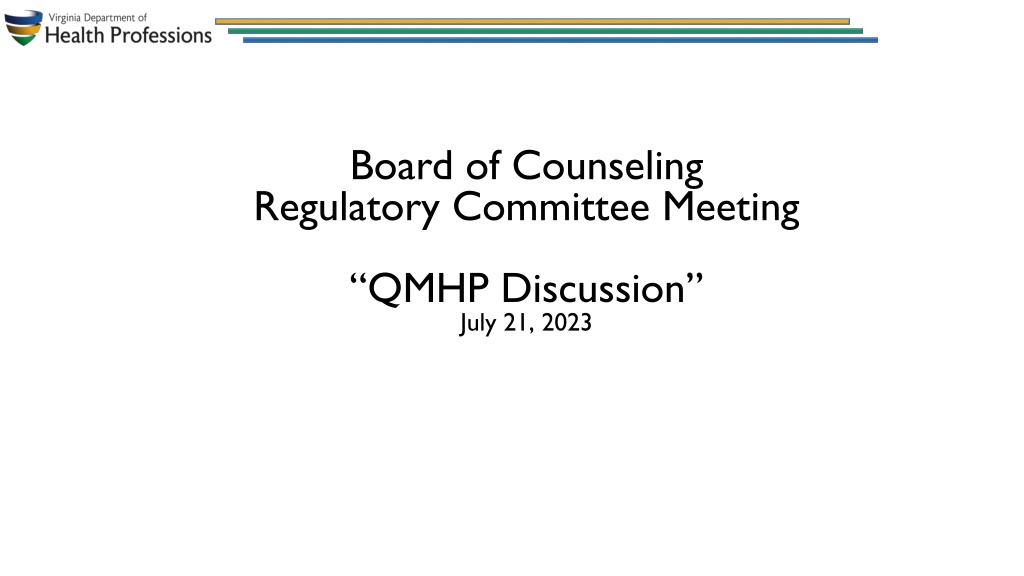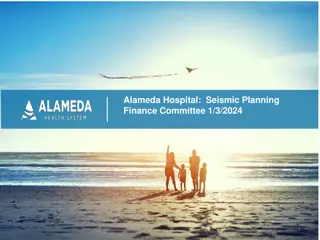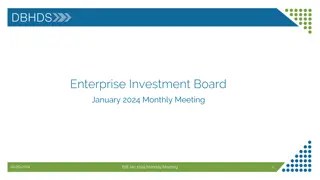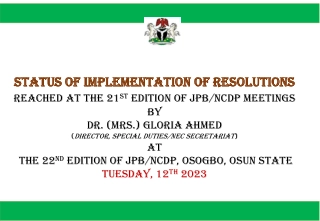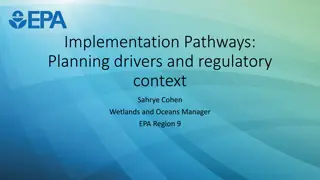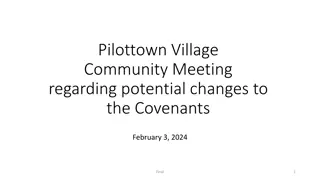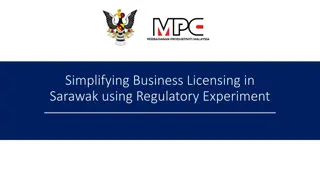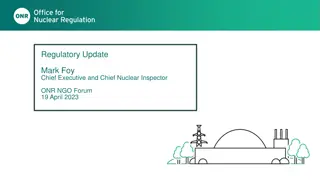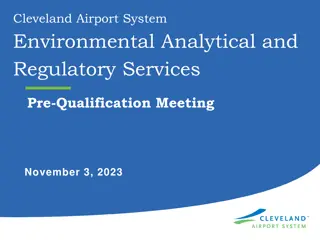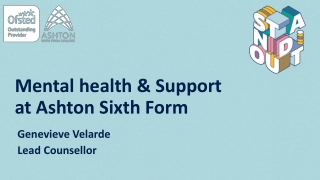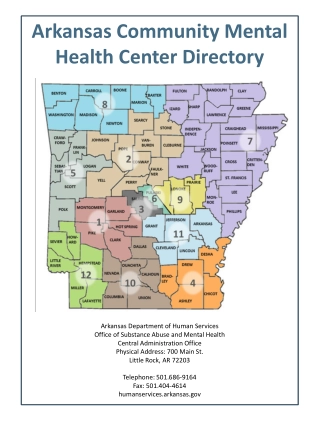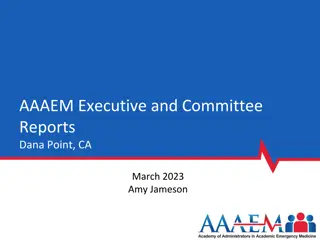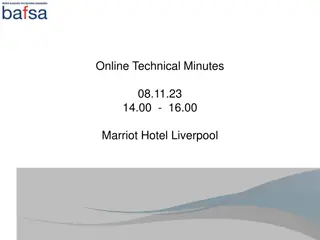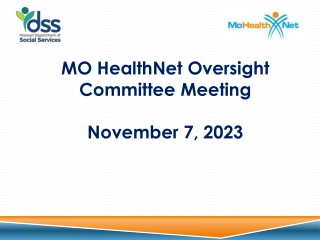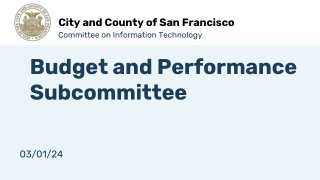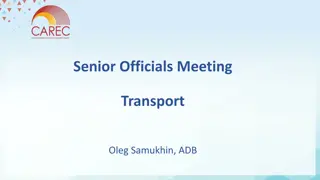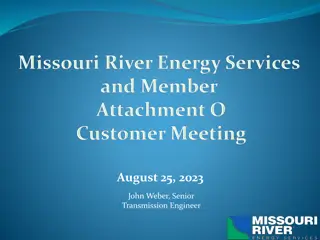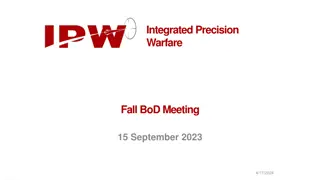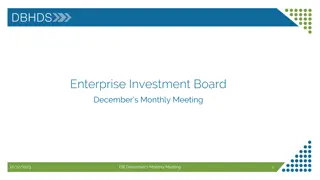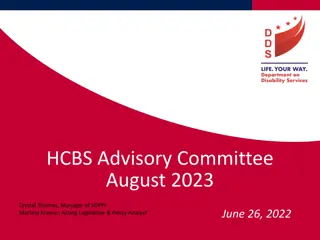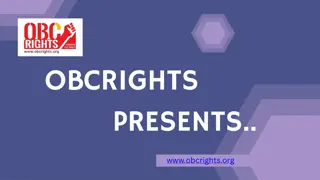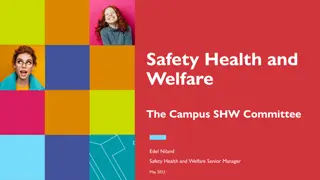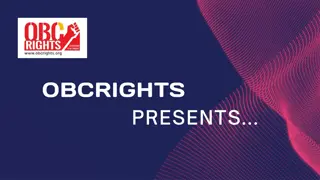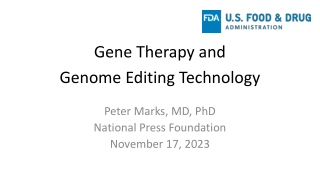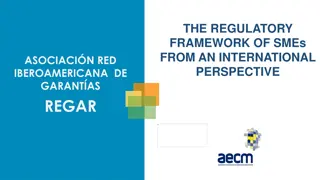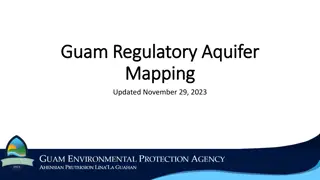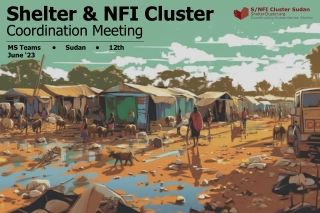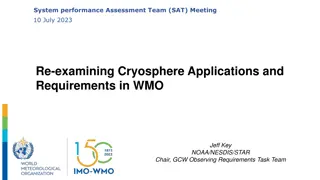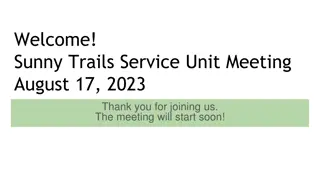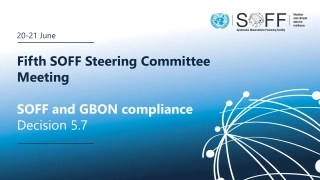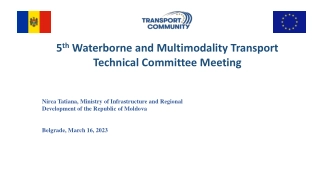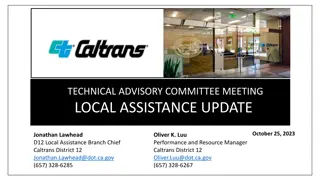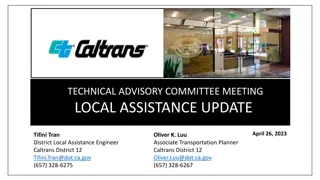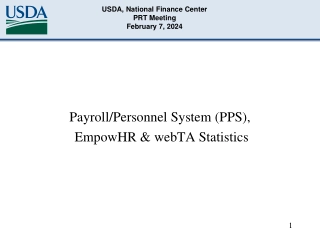Board of Counseling Regulatory Committee Meeting - QMHP Discussion Summary
The Board of Counseling Regulatory Committee meeting on July 21, 2023, focused on discussing current QMHP regulations, disciplinary statistics, DHP's role background, and survey feedback from stakeholders. The meeting covered QMHP definitions, including QMHP-A, QMHP-C, and QMHP-Trainee, along with their respective requirements for registration. The discussions aimed to address concerns and explore potential solutions related to collaborative mental health services in Virginia.
Board of Counseling Regulatory Committee Meeting - QMHP Discussion Summary
PowerPoint presentation about 'Board of Counseling Regulatory Committee Meeting - QMHP Discussion Summary'. This presentation describes the topic on The Board of Counseling Regulatory Committee meeting on July 21, 2023, focused on discussing current QMHP regulations, disciplinary statistics, DHP's role background, and survey feedback from stakeholders. The meeting covered QMHP definitions, including QMHP-A, QMHP-C, and QMHP-Trainee, along with their respective requirements for registration. The discussions aimed to address concerns and explore potential solutions related to collaborative mental health services in Virginia.. Download this presentation absolutely free.
Presentation Transcript
Board of Counseling Regulatory Committee Meeting QMHP Discussion July 21, 2023
Agenda Current QMHP regulations Current QMHP Disciplinary Statistics Background on DHP s Role Survey questions sent to RAP and Stakeholders Identified Concerns and Potential Solutions Summary
Background Current QMHP Regulatory Requirements
QMHP Definitions Collaborative mental health services means those rehabilitative supportive services that are provide by a QMHP, as set forth in a service plan under the direction of and in collaboration with either a mental health professional licensed in Virginia or a person under supervision that has been approved by the Board of Counseling, Board of Psychology, or Board of Social Work as a prerequisite or licensure. Mental health professional person who by education and experience is professionally qualified and licensed in Virginia to provide counseling interventions designed to facilitate an individual s achievement of human development goals and remediate mental, emotional, or behavioral disorders and associated distresses that interfere with mental health and development. QMHP includes qualified mental health professionals adult and qualified mental health professionals child QMHP-A a QMHP who provides collaborative mental health services for adults. A QMHP-A shall provide such services as an employee or independent contractor of DBHDS or the DDOC, or as a provider licensed by DBHDS. QMHP-C a person who by education and experience is professionally qualified and register y the board to provide collaborative mental health services for children and adolescents up to 22 years of age. A QMHP-C shall provide such services as an employee or independent contractor of the DBHDS or the DOC, or as a provider licensed by DBHDS. QMHP-Trainee means a person who is receiving supervised training to qualify as a QMHP registered with the Board.
QMHP-Trainee Requirements In order to register for a QMHP-trainee, prior to receiving supervised experience toward a QMHP-A, must provide verification of ONE of the following: Master s degree in psychology, social work, counseling, substance abuse, or marriage and family therapy from an accredited college or university; Minimum of bachelor s degree in a human services or related field from an accredited college or university; Current enrollment in a master s program in psychology, social work, counseling, substance abuse, marriage and family therapy , or human services with at least 30 semester or 45 quarter hours; Bachelors from an accredited college in an unrelated field that includes 15 semester credits or 22 quarter hours in a human services field; License as a registered nurse in Virginia. License as an occupational therapist.
QMHP-Trainee Requirements In order to register for a QMHP-trainee, prior to receiving supervised experience toward a QMHP-C, must provide verification of ONE of the following: Master s degree in psychology, social work, counseling, substance abuse, or marriage and family therapy from an accredited college or university; Minimum of bachelor s degree in a human services or special education from an accredited college or university; Current enrollment in a master s program in psychology, social work, counseling, substance abuse, marriage and family therapy , or human services with at least 30 semester or 45 quarter hours; License as a registered nurse in Virginia. License as an occupational therapist.
Guidance Document on Approved QMHP Degrees Art Therapy Behavioral Sciences Child Development Child and Family Studies/Services Cognitive Sciences Community Mental Health Counseling (Mental health, Vocational, Pastoral, etc.) Counselor Education Early Childhood Development Education (with a focus in psychology and/or special education) Educational Psychology Family Development/Relations Gerontology Health and Human Services Human Development Human Services Marriage and Family Therapy Music Therapy Nursing Psychiatric Rehabilitation Psychology Rehabilitation Counseling School Counseling Social Work Special Education Therapeutic Recreation Vocational Rehabilitation Sociology (accepted until May 31, 2021)
Pathways to QMHP-A Registration In order to qualify, you must provide evidence of ONE of the following: Master s degree in psychology, social work, counseling, substance abuse, or marriage and family therapy from an accredited college or university, you need: Evidence you have had an intern or practicum of at least 500 hours of experience with persons who have a mental illness. Minimum of bachelor s degree in a human services or related field from an accredited college, you need: Evidence of 1,500 hours of supervised experience (verification of supervised experience form) Bachelor s from an accredited college in an unrelated field, you need: 15 semester credits or 22 quarter hours in a human services field 3,000 hours of supervised experience License as a registered nurse in Virginia, you need: 1,500 hours of supervised experience License as an occupational therapist in Virginia, you need: With an internship or practicum of at least 500 hours or, 1,500 hours of supervised experience *All supervised experience must be obtained within a 5-year period immediately preceding the application for registration*
Supervised Experience Requirements for QMHP-A An applicant without an approved master s degree, shall provide documentation of providing direct services to individuals as part of a population of adults with mental illness in a setting where mental health treatment, practice, observation or diagnosis occurs. Services provided shall be appropriate to the practice of a QMHP-A. Services must be provided under the supervision of a licensed mental health professional or a person under supervision approved by a board as a pre-requisite for licensure under the Boards of Counseling, Psychology, or Social Work. Supervision obtained in another US jurisdiction shall be provided by a mental health professional licensed in Virginia or licensed in that jurisdiction. Consist of face-to-face training until supervisor determines competency in the provision of QMHP-A services, then supervision may be indirect (the supervisor is either on-site or immediately available for consultation with the person being trained). Hours obtained in a bachelor s or master s level internship or practicum in a human services field may be counted toward completion of the required hours. Supervised experience obtained prior to meeting the education requirements shall not be accepted.
Pathways to QMHP-C Registration In order to qualify, you must provide evidence of ONE of the following: Master s degree in psychology, social work, counseling, substance abuse, or marriage and family therapy from an accredited college or university, you need: Evidence you have had an internship or practicum of at least 500 hours of experience with children or adolescents who have a mental illness. Minimum of bachelor s degree in a human services or in special education from an accredited college, you need: Evidence of 1,500 hours of supervised experience License as a registered nurse in Virginia, you need: 1,500 hours of supervised experience License as an occupational therapist in Virginia, you need: 1,500 hours of supervised experience *All supervised experience must be obtained within a 5-year period immediately preceding the application for registration*
Supervised Experience Requirements for QMHP-C An applicant without an approved master s degree shall provide documentation of direct services to individuals as part of a population of children or adolescents with mental illness in a setting where mental health treatment, practice, observation or diagnosis occurs. Services provided shall be appropriate to the practice of a QMHP-C. Services must be under the supervision of a licensed mental health professional or a person under supervision approved by a board as a pre-requisite for licensure under the Boards of Counseling, Psychology, or Social Work. Supervision obtained in another US jurisdiction shall be provided by a mental health professional licensed in Virginia or licensed in that jurisdiction. Supervision must consist of face-to-face training until supervisor determines competency in the provision of QMHP-C services, then supervision may be indirect (the supervisor is either on-site or immediately available for consultation with the person being trained). Hours obtained in a bachelor s or master s level internship or practicum in a human services field may be counted toward completion of the required hours of experience. Supervised experience obtained prior to meeting the education requirements shall not be accepted.
QMHP Disciplinary Statistics Counseling Violations * Jan 1, 2018 - Jul 13, 2023 LPC (41) LMFT (7) LSATP (1) Resident in Coun (11) Resident in MFT (2) CSAC (9) CSAC-A (3) SA Supervisee (2) QMHP-A (28) QMHP-C (19) QMHP-T (7) RPRS (1) 5%-QMHPT 1%-RPRS 15%-QMHP-C 31%-LPC 21%-QMHP-A 7%-CSAC 8%-RIC 5%-LMFT 2%-SA Sup. 2%-CSAC-A 1% -LSATP 2%-RMFT
Credential Type Total Active Credentials (as of 7/13/2023) 8,793 3,106 1,035 163 441 14 1,655 2,370 244 6,034 3,978 9,091 557 Total Violations (1/1/2018 7/13/2023) 41 11 7 2 1 0 9 2 3 28 19 7 1 0.48% 0.40% 0.28% % of Credentials with Violations Licensed Professional Counselor (LPC) Resident in Counseling (RIC) Licensed Marriage & Family Therapists (LMFT) Resident in Marriage & Family Therapy (RMFT) Licensed Substance Abuse Treatment Practitioner (LSATP) Resident in SA Certified Substance Abuse Counselor (CSAC) Substance Abuse Supervisee (SA Supervisee) Certified Substance Abuse Counseling Assistant (CSAC-A) Qualified Mental Health Professional-Adult (QMHP-A) Qualified Mental Health Professional-Child (QMHP-C) Qualified Mental Health Professional-Trainee (QMHP-T) Registered Peer Recovery Specialist (RPRS) 0.47% 0.35% 0.67% 1.23% 0.22% n/a 0.54% 0.08% 1.23% 0.46% 0.48% 0.08% 0.18% Total Licensees Total Residents Total QMHPs/Trainees 10,269 3,283 19,103 49 13 54
Background for BOCs Role Ensure QMHP s meet the minimum requirements for the role to ensure public safety and alleviate this requirement from employers. Provide accountability and ensure public safety. Ensure that DMAS funds programs and people who are not a threat to public safety or committing fraud. With minimum requirements, DBHDS and DMAS have the flexibility to require more supervision, more education, or more years of experience for certain roles within their programs.
Questions sent to the QMHP Regulatory Advisory Panel, Stakeholders, and Board Members (1/2) 1.What types of services are QMHP'As, QMHP-Cs, QMHP-Trainees, and QMHPs not regulated by the Board of Counseling, providing in agencies? 2.Should the Board of Counseling regulate all QMHPs, not just those in DBHDS or DOC settings? 3.Please define the scope of practice for each type if you can. 4.Would defining in the regulations or Code, scopes of practice for the QMHPs be beneficial? 5.Do you feel that a bachelor's level degree is beneficial, or if a formal degree could be replaced with more supervision and/or specialized training? If so, what level of education and which specific courses/trainings are necessary. 6.Would in-depth required training provide a better foundation than a specific degree and or coursework? What information should be included in this training, how long, training by whom and when should the training take place? Or should there be multiple required trainings? 7.Do you think there should be additional or different levels of QMHPs with defined scopes of practice, education and experience? 8.Are the QMHP-A and QMHP-C designations necessary? How could they be changed or improved?
Questions sent to the QMHP Regulatory Advisory Panel, Stakeholders, and Board Members (2/2) 9. What education do you feel is the minimum amount necessary for each registration? 10. What are the barriers to practice? 11. Should the Board be more specific in the supervision requirements? 12. Why should the Board allow a QMHP to supervise? 13. What should be the minimum requirements to be a supervisor, and should the supervision be different if it was from someone other than a LMHP or resident (supervisee)? 14. If there are levels of QMHPs, should there be levels of supervisors and supervisor requirements, and what would that look like? 15. It seems like there is a lot of misinformation out in the public about the requirements and the expectations of QMHPs, how could the Board best address this?
Identified Concerns and Possible Solutions The following slides attempt to provide solutions that reflect the suggestions from the RAP and stakeholders.
Identified Concerns and Possible Solutions Education Requirements and Specialized Training
Education Requirements and Specialized Training Problem: The pathways to become a QMHP-A or a QMHP-C are numerous, varied, complicated, and subjective which ironically result in many individuals not having an affordable or appropriate pathway to becoming a QMHP. The regulations outline different combinations of education and experience over a long period of time and without detailed supervision requirements or prior training that would prepare QMHPs for the jobs they would work. The Board of Counseling (BOC) denies many applicants because they fail to meet the education requirements for this entry level position. The current pathways construct barriers to entry to practice as a QMHP, limit job flexibility, and fail to build or sustain a pipeline for the behavioral health care workforce. Community Services Boards (CSBs) report that the degree requirements have prevented people who have experience and willingness to take on the role. Specifically, they estimate that only half of the applicants for QMHP/QMHP-Trainee positions meet the requirements because many applicants have qualifying experience, but do not meet the field of study requirements. Many of those candidates have a sociology or criminal justice degree. It takes CSBs an average of 3-6 months to fill QMHP or QMHP -Trainee level positions.
Education Requirements and Specialized Training Potential Overhaul Solution: The BOC should streamline the regulatory process, eliminate the specific degree requirements, and instead require specialized training focused on the QMHP supportive role in the behavioral health care workforce. Amend the regulations to allow someone with minimum of an associate s degree to become a QMHP. Amend the regulations to require a specialized QMHP training. Amend the regulations to require a jurisprudence exam. Persons with an associate s,bachelor s, or master s degree must take the specialized QMHP training and the jurisprudence exam. No matter the education degree level, specialized QMHP training, one year of experience and passage of the jurisprudence exam would be necessary to be eligible for the QMHP.
Education Requirements and Specialized Training Potential Overhaul Solution Cont The BOC, DBHDS, VACSB, and DMAS should collaborate to develop the curriculum. The training could be offered through the community college system. There is already a framework for this type of training. If this is required, maybe consider changing the QMHP to a certification. Or, the training could be constructed in modules on a web-based platform. With this approach, the trainings should be competency-based with quizzes/tests for each module. With this approach it should probably remain a registration. The trainings could be made available on the platform where case management training modules are currently accessed. The QMHP training could pull information with revisions from already available training modules, such as the case management trainings, certified peer specialists, and direct support competencies. Suggested modules include Scope of work, Ethics, Fraud and Abuse reporting to DBHDS, Children s Protective Services (CPS)/Adult Protective Services (APS), DMAS, and BOC, Human Rights training, Addiction signs and symptoms, Crisis de-escalation, Person-Centered services, Accessing Emergency Services, Housing 101, Recognizing and Celebrating Diversity, HIPAA, working as a member of a treatment team, and Crisis Support Plans, and Documentation/record keeping. Again, there is already a framework to develop either type of training, so we do not start from scratch. To really expand the pipeline, the BOC, DBHDS, the Virginia Counselor Association (VCA), the CSBs, and DMAS could work with the Department of Education (DOE) or the Community Colleges to develop a Career and Technical Education (CTE) program for QMHPs. Upon completion of the program, the student would graduate high school with an associate s degree and completion of the QMHP specialized training and be eligible to register with the Board as a QMHP-trainee. The BOC would develop the jurisprudence examination focused on ethics, the standards of practice, and issues where the Board receives complaints. Focusing on these issues would ensure that QMHPs understand the regulations and their scope of practice, and hopefully prevent the current complaints and disciplinary actions the QMHPs currently face.
Education Requirements and Specialized Training Justification for an overhaul: Elimination of the specific degree requirements would open the field and allow job flexibility. As a profession currently regulated only as a registration, there technically should be no entry standard. Experience and tailored training matters more for this para-profession. Most survey responders noted degree should not matter because degree programs do not focus on therapeutic/helping skills. The CSBs noted that the 72-hour training course for certification of peer recovery specialists is similar to what should be taught to QMHPs. The QMHP is also similar to the Community Health Worker role and that training is 40 hours. Everyone with any degree could register as a QMHP-Trainee and then after completion of the specialized training, completion of one year of supervised experience, and passing the jurisprudence exam, could become registered as a QMHP. The CSBs noted that the diversity of degrees has been beneficial to helping clients.
Education Requirements and Specialized Training Potential Minimal Change Solution: Amend the guidance document to allow sociology and criminal justice degrees. Take no action.
Identified Concerns and Possible Solutions QMHP Designations
QMHP Designations Problem: The code and regulations provide three QMHP designations: QMHP-A, QMHP-C, and QMHP-Trainee. The QMHP-A and QMHP-C designations limit entry into the workforce and inhibit job flexibility. There is no reason for the separation. Licensed providers are not required to designate whether they work with children or adults. They just must have taken the requisite continuing education to ensure that they have the requisite knowledge and training to provide the appropriate services. The same should be true for QMHPs. If the BOC opts to have a required specialized training, then it would include the training necessary to work with all populations. Having separate designations is a barrier to providing services and recruiting staff. The scope of work is the same.
QMHP Designations Potential Overhaul Solution: The QMHP-A and QMHP-C should be collapsed into one designation and the BOC would continue to register QMHP-Trainees. Continuing to register QMHPs would coincide with stronger supervision requirements. Take no action
Identified Concerns and Possible Solutions QMHP Supervision Requirements
QMHP Supervision Requirements Problem: The regulations only allow an LMHP to supervise all categories of QMHPs. There is already a limited supply of LMHPs available to provide much-needed clinical services to the Commonwealth and supervision demands prevent LMHPs from devoting time to the clinical services. There remains a shortage of LMHPs in the public sector to supervise QMHPs, which leads to reductions in needed services. Additionally, LMHPs are also supervise residents for licensure. As such requiring only LMHPs to supervise QMHPs adds more strain to the system. QMHP by virtue of having more education is a faulty assumption. The day-to-day challenges and their power differential within systems are different. An experienced QMHP can problem-solve from lived experience. QMHPs know QMHP work, which is mostly targeted case management. LMHPs do not necessarily make good case managers. Seasoned and specially trained QMHPs can provide supervision that is more specific to the profession. Many LMHPs have never worked as QMHPs. To assume they can appropriately supervise a
QMHP Supervision Requirements Potential Overhaul Solution: The BOC should add a QMHP-Supervisor designation and develop a supervision structure that relieves the supervision burden on LMHPs, reduced the amount and time LMHP must supervise QMHPs by allowing certain QMHPs to provide some supervision of other QMHPs. A QMHP could obtain the QMHP-Supervisor designation with 5 years of experience, no founded complaints or disciplinary action, and completion of a QMHP Supervisor training. This designation would allow a QMHP, in collaboration with an LMHP, to supervise less-experienced QMHPs. Because the QMHPs are already a large number and continue to grow, it seems that the LMHP time would be better utilized focusing on the supervision of the smaller number of QMHP-trainees who need the most intense supervision in the beginning of their careers. Then, we could utilize experienced QMHPs to provide ongoing supervision to newer, less-experienced QMHPs. The supervision requirements would be more intensive for the trainees and would be spelled out in the regulations. Ongoing supervision of QMHPs would also be spelled out in the regulations.
QMHP Supervision Requirements Potential Overhaul Solution: The BOC should add a QMHP-Supervisor designation and develop a supervision structure that relieves the supervision burden on LMHPs, reduced the amount and time LMHP must supervise QMHPs by allowing certain QMHPs to provide some supervision of other QMHPs. (Cont) The LMHP would also have to complete the QMHP supervisor training and would be required to meet regularly with the QMHP-trainees. But with less QMHP-trainees, the LMHPs could better utilize their skills, experience and knowledge providing clinical care to the public. And because the QMHP-Supervisors have met the certification requirements, have 5 years of experience, and have taken the supervision course they are in an appropriate position to take on more of the supervisory responsibilities and relieve the burden on the LMHPs. Of course, QMHPs cannot act independently so there will always be an LMHP ultimately responsible. The specifics of the ongoing supervision would be left to DMAS and the providers. The QMHP supervision training itself could also be in modules and mirror the supervision requirements for LMHPs. At a minimum any training should include information about ways to document supervision, topics to be covered, addressing concerns, and when to escalate to a LMHP.
QMHP Supervision Requirements Tiered Supervision Solution: We could create two levels of QMHP Supervisor. A QMHP Supervisor-1 with 5 years experience, no founded complaints or disciplinary action, and completion of a QMHP Supervisor training. A QMHP Supervisor 2 with 10 or more years of experience, no founded complaints or disciplinary action, and completion of QMHP Supervisor training. A QMHP Supervisor-2 could supervise the QMHP-trainees because they are most familiar with the role. The QMHP Supervisor-Level-1 could supervise lesser experienced QMHPs. The LMHP remains ultimately responsible and could supervise the QMHP supervisors. The regulations would define the amount of time for supervision and it would be the same for each level. Additionally, DMAS and the providers could dictate the specifics of the supervision. TAKE NO ACTION
Identified Concerns and Possible Solutions QMHP Scope of Practice
QMHP Scope of Practice Problem: Neither the Code nor the Regulations define the scope of practice for QMHPs. Lack of a defined scope of practice causes confusion and uncertainty for QMHPs, LMHP supervisors, and the public. A QMHP cannot know what they cannot do if they are unclear as to what they can do and vice versa.
QMHP Scope of Practice Potential Overhaul Solution: Potential Overhaul Solution: Th code or regulation and produce a guidance document and chart like the one code or regulation and produce a guidance document and chart like the one created for Substance Use Disorders created for Substance Use Disorders The e BOC should define the scope of practice in BOC should define the scope of practice in The BOC should collaborate with DBHDS and DMAS to define the scope. Collaboration will help to ensure continuity and clarity for providers. TAKE NO ACTION
Identified Concerns and Possible Solutions Regulating All QMHPs
Regulating all QMHPs Problem: The BOC only regulates QMHPs employed with the DBHDS and the Department of Corrections (DOC) The CSBs expressed frustration that the needed regulations hold them to a higher and more burdensome standard in comparison to some of the private providers who allegedly utilize QMHPs to do most of their work (unlicensed practice), and just utilize LMHPs for signatures.
Regulating All QMHPs Potential Potential Overhaul QMHPs regardless of setting. The BOC should regulate all QMHPs just as they do all LMHPs, regardless of setting. The need for accountability does not depend on the setting. Regulating all QMHPs would ensure consistency with experience, would define minimum qualifications, and allow a QMHP to change employers with the reassurance that the BOC has vetted and verified the education, experience, and disciplinary concerns. Once the definitions are changed, the BOC must ensure that the legislation carries an emergency clause so that the regulations can be adopted quickly. The BOC would have to coordinate the timing of these definition changes with DBHDS and DMAS to ensure consistency and clarity for providers and the public. Overhaul Solution Solution: : The Board should amend the definition of a QMHP and regulate all TAKE NO ACTION
Identified Concerns and Possible Solutions Name Change
Regulating all QMHPs Problem: The name Qualified Mental Health Professional is misleading. The BOC has never liked the name Qualified Mental Health Professional because they feel it is misleading. The definition of a mental health professional is stated right above the definition of a QMHP and it is misleading.
Name Change Potential Potential Overhaul QMHP If the BOC amends the Code to change the definition or to collapse the QMHP-A and QMHP- C into one designation, they should change the name. Suggestions have included Behavioral Health Support Specialist (BHSS) or Behavioral Health Wellness Coach (BHWC). Overhaul Solution Solution: : The Board should change the name of the TAKE NO ACTION
Identified Concerns and Possible Solutions Creation of Advisory Board
Creating an Advisory Board Problem: The QMHPs are the largest profession regulated under the BOC and yet they have no voice on the BOC. The workforce and settings are very different for LMHPs and QMHPs. Any profession being regulated should have a voice. not have a voice on the Board. CSACs, Registered Peer Recovery Specialists (RPRS), and Certified Rehabilitation Providers (CRPs) do TAKE NO ACTION
Creating an Advisory Board Potential Potential Overhaul Advisory Advisory Board Board Overhaul Solution Solution: : Create Create a a BOC BOC Allied Allied Health Health The Advisory Board could consist of 5 members: two QMHPs, one CSAC, one citizen member, and one other that would prioritize being filled by a RPRS or CRP, but if the numbers are low, it could be filled by a QMHP or CSAC as well.
Summary The above Recommendations provide solutions that reflect the responses from the RAP and stakeholders. The Overhaul recommendations aim to reduce barriers for a registered profession and provide targeted training, more specificity with respect to scope and supervision, as well as more structured supervision that allows LMHPs to provide the services they need and the QMHPs to remain supportive of the LMHPs. All but one of the survey respondents objected to a tiered system, or more levels of QMHPs.
Next Steps What needs to happen now to move forward with the Recommended Overhaul solutions? Statutory Changes with an Emergency Enactment Clause. These changes would become effective July 1, 2024. Regulatory changes where discussion could be ongoing through July 1, 2024, with the intent to adopt a NOIRA, in conjunction with DBHDS and DMAS, to implement the required regulatory changes within 240 days.
Next Steps (Cont.) Statutory Changes: Change the name and definition of a QMHP and QMHP-Trainee, which could include a scope of practice, training and supervision requirements (emulate the statutory framework for substance use providers). Determine if the QMHP should become a certification with the requirement of passage of a test by a testing company approved by the Board or remain a registration which would not require a test. Determine the training program required (something in conjunction with the Community Colleges which are already in existence) Create a QMHP-Supervisor Designation We could also at the same time create an LMHP supervisor designation because this seems to be wanted in the community and would be clear to the public. Eliminate the QMHP-A and QMHP-C statuses. Create an Advisory Board.
Next Steps (Cont.) Legislative Changes: Establish fees. Change the definitions to match the statutory changes. Outline the specific requirements for submitting an application and include a grandfather provision. Outline more specific CE requirements.
